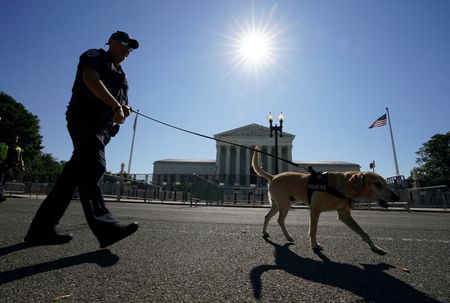By Blake Brittain
WASHINGTON (Reuters) – A trademark dispute over a poop-themed dog toy shaped like a Jack Daniel’s whiskey bottle coming before the U.S. Supreme Court could redefine how the judiciary applies constitutional free speech rights to trademark law.
In a case to be argued on Wednesday, the nine justices are expected to use this legal dogfight to clarify the line between a parody protected by the U.S. Constitution’s First Amendment and a trademark-infringing ripoff, with repercussions extending beyond booze and pet accessories. A ruling is due by the end of June.
Jack Daniel’s Properties Inc, owned by Louisville, Kentucky-based Brown-Forman Corp, is appealing a lower court’s decision that Phoenix-based VIP Products LLC’s “Bad Spaniels” chew toy is an “expressive work” protected by the First Amendment.
Some companies have expressed concern that a ruling against Jack Daniel’s would weaken their control over their brands and reputations. Others argue that a ruling favoring the whiskey maker would stifle free-speech rights.
“This is an interesting case because it’s a court that does care about the First Amendment but also cares about business,” said Elizabeth Brannen, a partner at the law firm Stris & Maher who has worked on intellectual property cases before the Supreme Court. “And this is a case where those interests intersect in a way that’s kind of hard to sort out.”
The toy mimics Lynchburg, Tennessee-based Jack Daniel’s famous whiskey bottles with humorous dog-themed alterations – replacing “Old No. 7” with “the Old No. 2, on your Tennessee Carpet” and alcohol descriptions with “43% Poo By Vol.” and “100% Smelly.”
“Jack Daniel’s loves dogs and appreciates a good joke as much as anyone,” the company told the justices in a brief. “But Jack Daniel’s likes its customers even more, and doesn’t want them confused or associating its fine whiskey with dog poop.”
THE ROGERS TEST
The San Francisco-based 9th U.S. Circuit Court of Appeals in its 2020 ruling in favor of VIP cited a 1989 decision by the New York-based 2nd U.S. Circuit Court of Appeals in a case brought by Hollywood legend Ginger Rogers. The actress unsuccessfully sued to block the release of the 1986 film “Ginger and Fred” from director Federico Fellini that referred to her famed dance partnership with actor Fred Astaire.
That precedent lets artists use trademarks if they have artistic relevance to a work and would not explicitly mislead consumers into thinking the trademark owner endorsed it.
Jack Daniel’s said that under the 2nd and 9th Circuit decisions, “anyone could use a famous mark to sell sex toys, drinking games or marijuana bongs, while misleading customers and destroying billions of dollars in goodwill – all in the name of just having fun.”
President Joe Biden’s administration supports Jack Daniel’s appeal, saying in a brief the 9th Circuit should have applied the normal standard for trademark infringement – whether a product creates a likelihood of confusion – with parody among several factors to consider.
Prominent brand owners including Nike, Campbell Soup, Patagonia and Levi Strauss told the Supreme Court that the 9th Circuit wrongly applied the Rogers test to consumer products and that a ruling for VIP would threaten their ability to protect their brands from bad actors.
VIP Products has said a ruling favoring Jack Daniel’s would make it easier for trademark owners to stifle free speech.
“Every First Amendment case has a spillover effect into other areas,” VIP’s attorney Ben Cooper of the firm Dickinson Wright said in an interview. “So this can’t be seen as being compartmentalized into the world of trademarks.”
“Whenever one person’s speech is limited, it gets everyone else nervous,” Cooper added.
VIP told the justices its toy comments on “iconic alcohol brands’ self-serious bombardment of consumers with advertising and dog owners’ joyful humanization of their pets.”
A group of intellectual property professors told the court the First Amendment was “under attack by brand owners that lack a sense of humor, monopolize discussion about their brands and exaggerate the harm expressive references cause to their trademarks.”
Megan Bannigan, a partner at the firm Debevoise & Plimpton who submitted the brief, said the impact of dumping the Rogers test could “go well beyond parody” and “impact all expression.”
The Brooklyn modern-art collective MSCHF, which has faced trademark lawsuits from Nike and Vans, filed a brief supporting VIP’s argument.
Its attorney, Bill Patterson of the firm Swanson Martin & Bell, said the case is “supremely important to MSCHF as it threatens its ability to challenge and comment on culture outside the safe havens of white-walled galleries.”
MSCHF’s brief included “connect-the-dots” puzzles for the justices and their law clerks to complete and return for the collective to sell, with winking references to their personal histories and famous trademarks. Patterson said the group has not yet received any of them back.
(Reporting by Blake Brittain in Washington; Editing by Will Dunham)





